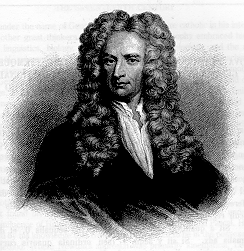 |
 |
 |
 |

Newton entered Trinity College, Cambridge, in 1661, where he studied the works of such modern thinkers as Boyle, Descartes, Gassendi, Galileo, and Wallis. When an outbreak of the plague closed the university in 1665, Newton retired to Lincolnshire and began his pathbreaking work in physics, astronomy, optics, and mathematics.
His earliest major work was on mathematics. At the same time that Leibniz was developing the theory and techniques of calculus, Newton, working independently on what he called the "method of fluxions," arrived at many of the same conclusions, and made possible nearly all subsequent mathematical and scientific investigation.
On the strength of this work, Newton was named Lucasian Professor of Mathematics at Cambridge in 1669, when he was only twenty-seven. There he began a course of lectures on optics, in which he argued that white light is in fact a composite of all the colors in the spectrum. He applied his discoveries in the invention of the reflecting telescope, which he donated in 1671 to the Royal Society, and was elected a fellow of the Society in the following year.
After bitter public debates with Chrstian Huygens and Robert Hooke, Newton withdrew for a time from public academic work in 1675, and worked on his own chemical and alchemical experiments. After Hooke's death, Newton published his Opticks in 1704.
The popular story of the theorist of gravity sitting under an apple tree is of course apocryphal; but Newton's most influential work was, in fact, in the field of gravitation and celestial mechanics. As early as 1666 he had formulated his laws of motion, and soon entered into further debates with Hooke. He hypothesized that the moon was held in its orbit by the contrary forces of the earth's gravity and the moon's centrifugal force, and developed the theory that the force of gravity was inversely proportial to the square of the distance between the two bodies. The theory was essential in the calculations of Edmond Halley, then a young astronomer, who persuaded him to publish a systematic account of his works. The result was the Philosophiae naturalis principia mathematica (1687), widely known as the Principia, Newton's most important single work and the first statement of the law of universal gravitation.
A personal mental crisis in 1693 led to Newton's retirement from active scientific research; he became Warden of the Royal Mint in 1696, and was promoted to Master in 1699, supervising England's coinage policies. In 1703 he was elected President of the Royal Society, and was the first scientist to be knighted (by Queen Anne in 1708).
He is less well known for his research into biblical prophecies and alchemy. His work provided a basis for David Hartley's psychological theory of association.
"If I have seen further," Newton wrote famously in 1676, "it is by standing on the shoulders of giants."